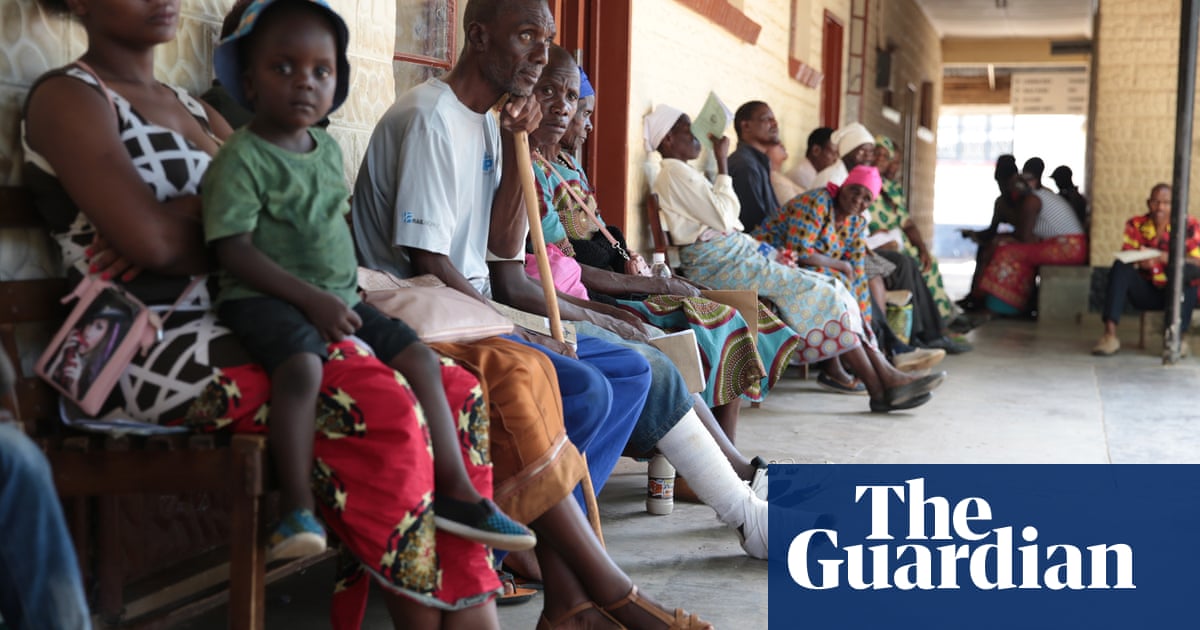
It took nearly three hours of queueing in Ikorodu general hospital in Lagos state, Nigeria, before Hadijat Hassan, a retired civil servant, could see a nurse. The 66-year-old has attended the clinic for health checks since being diagnosed with diabetes nearly 10 years ago. But since May, she says, the delays, often while suffering from excruciating pain in her legs, are worse than ever.
“You can get there [the hospital] and meet about 50 people waiting to be attended to,” Hassan says. “They said all of their nurses and doctors have been leaving for abroad. Just a few are left.”
In Nigeria, there is one doctor for every 5,000 patients, whereas the average in developed countries is one doctor for about every 254 people.
A hospital official said the Ikorodu management get resignation notices from nurses and doctors almost every month.
“Many leave for the US, Canada, UK and, most recently, Australia,” says the official, who asked to remain anonymous.
The National Association of Nigeria Nurses and Midwives has reported there is now a ratio of one nurse to 1,160 patients. Its president, Michael Nnachi, said that more than 75,000 nurses had left Nigeria since 2017.
“If you look at the conditions of service of health workers generally, you’ll see the difficult challenges complicated by the current economic realities,” he said, adding that rising inflation has compounded the problems.
“Conditions of service are very important. And social security. People need to be assured that their employment is intact and entitlements are paid when due. Nurses are at the centre of the healthcare service and should be taken care of to improve the system.”
The World Health Organization predicts a worldwide shortage of 10 million health and care workers by 2030 – mostly in low-income countries, where people are leaving for opportunities abroad.
This is despite the WHO’s introduction of a safeguard list to stop rich countries poaching from poorer countries with staff shortages.
The “red list”, launched in 2020 with plans to update it every three years, includes Nigeria, Ghana, Zimbabwe and 34 other African countries. Yet the UK’s nursing regulator, the Nursing and Midwifery Council, says more than 7,000 Nigerian nurses relocated to the UK between 2021 and 2022.
Data from the Ghana Registered Nurses and Midwives Association shows that nearly 4,000 nurses left the country in 2022. In Zimbabwe, more than 4,000 health workers, including 2,600 nurses, left in 2021 and 2022, the government said.
The WHO has no powers to prohibit recruitment of doctors from countries on the list, but recommends “government-to-government health worker migration agreements be informed by health labour market analysis and the adoption of measures to ensure adequate supply of health workers in the source countries”.
Health sector organisations, however, say it appears to be ineffective in stemming the tide and countries such as the UK flout the safeguard list. The latest data from the Nursing and Midwifery Council show significant increases in recruitment of nurses from outside Europe, including those countries on the WHO red list.
The nurses’ union, the Royal College of Nursing, said those entering the UK workforce included recruits from 14 countries on a red list of 47 that the UK government had stipulated should not be recruitment pools.
“The UK list mirrors the WHO, which says these 47 countries face the most pressing health workforce shortages and have been identified as having serious workforce challenges and must not be targeted for systematic recruitment by NHS or independent employers,” the RCN said when the data was released.
The union added that the increases have led to concerns that the UK government is “heavily reliant” on filling vacancies with nurses from countries with critical workforce shortages.
The British government only stops third parties such as agencies from recruiting but allows individuals to apply directly to the NHS or care homes.
In a revised code of practice issued this year, the UK government confirmed that the embargo was not applicable to “direct application”.
“For the purpose of this code of practice, a ‘direct application’ is when an individual makes an application directly and on their own behalf to an employing organisation,” reads the government website.
The WHO director general, Tedros Adhanom Ghebreyesus, this year called on the list to be respected.
“Health workers are the backbone of every health system, and yet 55 countries with some of the world’s most fragile health systems do not have enough and many are losing their health workers to international migration,” he said.
“WHO is working with these countries to support them to strengthen their health workforce, and we call on all countries to respect the provisions in the WHO health workforce support and safeguards list.”
When Elizabeth Fadziso landed in London from Harare in April, it was a fresh start for the 30-year-old Zimbabwean nurse. She had hoped to work abroad since starting her nursing degree, prompted by poor welfare conditions for health workers in Zimbabwe and lack of medical equipment.
When she finished her studies in 2020, Fadziso applied for a certificate of good standing from the government, a document required of nurses who want to work abroad, but met a brick wall. The Zimbabwean government had stopped issuing the document, in an effort to prevent nurses leaving.
Fadziso says she was stuck in the process for more than a year before she decided she would forgo her qualification, and took a job as a carer in a nursing home in Liverpool.
“I couldn’t wait any longer,” she says. “I had to take the opportunity. At least it is better than staying back at home.”
Fadziso is determined to repeat her nursing degree in the UK. “It will take time but I don’t mind,” she says.
Setfree Mafukdize, another nurse working in Britain, knows many trained nurses who are settling for “lesser” jobs.
“Nurses, especially from my own country, Zimbabwe, are coming through the healthcare assistant route,” he says. “They forgo their original qualifications as nurses and are coming into the UK as carers.”
Mafukdize says he relocated to the UK with his family in 2021 because of the intolerable state of Zimbabwe’s health sector – unpaid and under-resourced. “People are really desperate to get out because they feel their prospects are really low in Zimbabwe.
“They are taking other routes because the UK is not only recruiting nurses but also care workers, who don’t need to have any form of registration to work in the UK.”
Mafukdize’s monthly pay in Zimbabwe was the equivalent of £120, insufficient to live on.
“You’ll always end up struggling to make ends meet,” he says.
In Ghana, which is also experiencing an economic crisis, the government announced a freeze on public sector recruitment in 2022, which took effect this year.
The president of Ghana Registered Nurses and Midwives Association, Perpetual Ofori-Ampofo, urged the government to consider the inadequate number of health workers when implementing the hiatus.
“I wish to state emphatically that the nursing and midwifery workforce is not adequate and, therefore, we need those who have completed nursing schools to be employed to support health care delivery,” she says.
Daniela (not her real name), is a hospital nurse in Ghana’s Volta region. She says many of her colleagues are leaving and not being replaced.
“The government has stopped [recruiting],” she says. “It is we who are left that are doing the job. If everyone is leaving, there won’t be enough people left.”
She says she has no intention of leaving and is content with her monthly salary of 2,500 cedis (£175). She accuses colleagues who have left of being “selfish”.
“I have been pressured by even my family members,” she says. “They ask why I am not doing what others are doing. Leaving doesn’t solve the problem, it compounds it.”
Governments across affected African nations have been pushing various legislation to curb the brain drain.
In April, Nigeria’s Medical and Dental Practitioners Act (Amendment) Bill, 2022, aimed at curbing the exodus of medical professionals, passed its second reading. If passed by the senate, the bill would make it compulsory for medical graduates to work in Nigeria for five years before being granted their full licence.
Zimbabwe’s vice-president, Constantino Chiwenga, has also announced plans to criminalise foreign recruitment of its workers.
“If one deliberately recruits and makes the country suffer because it lacks the required professionals, that’s a crime against humanity,” Chiwenga said in April.
“If people die in hospitals because there are no nurses and doctors, that must be taken seriously.”
But Julian Ojebo, a consultant anaesthetist at Irrua specialist teaching hospital, in Nigeria’s Edo state, says legislation does not go far enough, as the brain drain is not limited to the health sector. “Even people in the military and commerce are leaving the system. Check what is happening in Canada today – we have people from the banking sector [and] engineering moving there.”
Ojebo believes there are things governments can do. “One of the options is to actively employ. There should be active employment of nurses and doctors,” he says.
Shehu Sani, a former Nigerian senator and rights activist, says health workers will stay only if prospects improve.
“Doctors and nurses are leaving for greener pastures in the west and the Middle East. Do we need a law to stop them or do we need to improve on their working conditions in order to keep them?”











